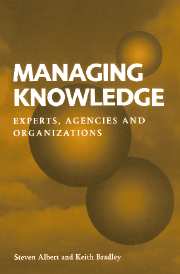Book contents
- Frontmatter
- Contents
- List of figures
- List of tables
- Introduction: the supply-side in context
- Part 1 Expert employees and their new organization
- 1 Trends in the labour market
- 2 Adaptations in the labour market and the expert employee
- 3 From the firm to the agency
- 4 Expert agency employment as a facilitator of intellectual capital
- 5 The temporal advantages of agency work for the expert employee
- 6 Taking stock
- Part 2 The labour market and the expert employee
- Appendix A Formal exposition of Winston model
- Appendix B Agency employment and search costs
- Notes
- References
- Index
1 - Trends in the labour market
Published online by Cambridge University Press: 23 November 2009
- Frontmatter
- Contents
- List of figures
- List of tables
- Introduction: the supply-side in context
- Part 1 Expert employees and their new organization
- 1 Trends in the labour market
- 2 Adaptations in the labour market and the expert employee
- 3 From the firm to the agency
- 4 Expert agency employment as a facilitator of intellectual capital
- 5 The temporal advantages of agency work for the expert employee
- 6 Taking stock
- Part 2 The labour market and the expert employee
- Appendix A Formal exposition of Winston model
- Appendix B Agency employment and search costs
- Notes
- References
- Index
Summary
The steam engine has relieved them of much of the exhausting and degrading toil; wages have risen; education has been improved and become more general; the railway and the printing press have enabled members of the same trade in different parts of the country to communicate easily with one another … while the growing demand for intelligent work has caused the artisan classes to increase so rapidly that they now outnumber those whose labour is entirely unskilled … some of them already lead a more refined and noble life than did the majority of the upper classes even a century ago.
Alfred Marshall, Principles of EconomicsIn the late nineteenth century, social scientists recognized the important effects that the changes in technology and the increased demand for specialized skills had on the labour market. In their terms, the new technology meant a real increase in the ability to purchase and consume an increased variety of goods and services, resulting in ‘steady progress for the working classes’. This was seen to be accompanied by an ‘emancipation from custom, and the growth of free activity’ resulting in a special character of business. Just before and just after the turn of the century, business and labour markets had changed dramatically.
We argue that in the late twentieth century the character of business and of the labour market has also changed significantly on account of: (i) an increasing proportion of women in the labour market; (ii) moves toward a larger service industry sector; and (iii) a rapid development of information technologies.
- Type
- Chapter
- Information
- Managing KnowledgeExperts, Agencies and Organisations, pp. 17 - 35Publisher: Cambridge University PressPrint publication year: 1997



